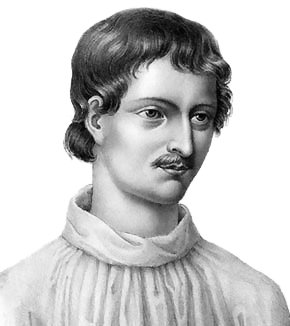Just want to take a second to recognize my man Giordano Bruno for his contributions to astronomy and his unwavering courage, even when he was burned at the stake by the Catholic Church in 1600 for his forward-thinking beliefs.
Here's an abbreviated thread on his life story:
Here's an abbreviated thread on his life story:
Bruno was born in Italy in 1548, just five years after Copernicus proposed his theory that the Earth and the other planets orbit around the Sun, and not the other way around.
He was ordained at age 24 in Naples, but ran into trouble with the Church for his free-thinking ideas.
He was ordained at age 24 in Naples, but ran into trouble with the Church for his free-thinking ideas.
Bruno left Naples in 1576 and traveled extensively throughout Italy, France, England, and Germany during his 20s, 30s, and 40s. In his travels, he studied with scholars, lectured at universities, and wrote many important works.
Some of Bruno's written works included the first ever proposals that the stars were "distant suns surrounded by their own planets," a theory that we now know is correct with the discoveries of exoplanets. Bruno also adopted the radical idea that life may exist elsewhere.
Bruno staunchly believed Copernicus' heliocentric theory that the Earth orbited around the sun and used it in his lectures, including at Oxford University. While there, he met ridicule by his superiors for his ideologies.
George Abbot, later the Archbishop of Canterbury, mocked Bruno by saying "the opinion of Copernicus that the earth did go round, and the heavens did stand still; whereas in truth it was his own head which rather did run round, and his brains did not stand still."
He found ridicule for his ideologies nearly everywhere he went, including some instances where he was met with violence, and bounced around lecturing and teaching jobs throughout Europe. In 1591, he was invited to tutor a local aristocrat in Venice and returned to Italy.
Venice was the most liberal-thinking region in Italy at the time, so Bruno believed he had a chance to make an impact with his teachings. He applied for a vacant chair of mathematics at a local university, but he lost it to Galileo Galilei.
After two months of tutoring in Venice, the local aristocrat became unhappy with Bruno's ideologies, and reported Bruno to the Catholic Church. He was arrested in Venice in 1592 on charges of blasphemy and heresy, particularly for the idea that other worlds existed.
Although he defended himself well during his trials in Venice, the Catholic Church in Rome requested the trial to be moved there in 1593. The trial went on in Rome for seven years and Bruno was held in confinement for that entirety.
Throughout this trial, Bruno insisted that he had accepted the Church's teachings, but believed his ideologies around astronomy and cosmology were philosophical and therefore shouldn't concern the Church. He held firm to his beliefs, particularly the idea of other worlds.
Roman Cardinal Bellarmine, one of the judges in his trial, demanded he recant his statements, to which Bruno refused. In January, 1600, Pope Clement VIII declared him a heretic, and the judges sentenced him to death. A month later, he was burned at the stake in a Roman square.
Upon receiving his death sentence, Bruno allegedly told his judges: "Perhaps you pronounce this sentence against me with greater fear than I receive it."
If that's not the most badass statement to say to Catholic Cardinals who just sentenced you to death, I don't know what is.
If that's not the most badass statement to say to Catholic Cardinals who just sentenced you to death, I don't know what is.
Nine years after Bruno's death in 1609, Galileo used the newly-invented telescope to make important leaps in our understanding of the universe. Eventually, more and more science from observational astronomy confirmed Copernicus' theories that Bruno loyally taught and believed.
Nearly 400 years later in 1995, the first exoplanet orbiting a star was discovered, confirming Bruno's "radical" idea that the stars were "distant suns surrounded by their own planets."
Will his idea that life existed elsewhere be confirmed too? Guess we'll have to wait and see.
Will his idea that life existed elsewhere be confirmed too? Guess we'll have to wait and see.

 Read on Twitter
Read on Twitter


